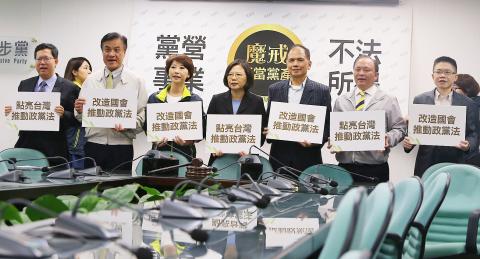The Democratic Progressive Party’s (DPP) Central Standing Committee yesterday adopted a resolution aimed at regulating political party assets, while prohibiting parties to run businesses, specifically targeting the Chinese Nationalist Party (KMT).
“The issue of party assets is not only something concerning the nation’s transitional justice, it would also damage democracy in Taiwan, as it creates unfair competition,” DPP Chairperson and presidential candidate Tsai Ing-wen (蔡英文) told a news conference following the committee’s meeting in Taipei.
“After the next legislature is inaugurated, the DPP will seek to cooperate with all parties to pass a [proposed] political party act, which would define a political party as a non-profit organization, limiting its sources of funding to membership fees, political donations made according to the law, government subsidies and interest thereof,” she added.

Photo: CNA
Tsai said party-run businesses are the “cancer of democracy,” adding that they should be strictly prohibited.
“Although the KMT says that it has put all of its party assets into trust, it is still able to profit from interests via operations and handling of [companies’] assets, leading to unfair competition among political parties,” she said.
In addition to prohibiting political parties from running businesses, Tsai said that there should also be a law to address illegitimate party assets.
“I would like to call on [KMT chairman] Eric Chu [朱立倫] to cease selling off KMT assets,” Tsai said. “As for business leaders, I would like to urge them to not be involved in transactions concerning KMT assets based on corporate social responsibility and ethics, to avoid being trapped in disputes in the future.”
One of the richest political parties in the world, the KMT controversially obtained many of its party assets after taking over properties left by the Japanese after World War II, although the properties should be owned by the government, not a political party.

AIR SUPPORT: The Ministry of National Defense thanked the US for the delivery, adding that it was an indicator of the White House’s commitment to the Taiwan Relations Act Deputy Minister of National Defense Po Horng-huei (柏鴻輝) and Representative to the US Alexander Yui on Friday attended a delivery ceremony for the first of Taiwan’s long-awaited 66 F-16C/D Block 70 jets at a Lockheed Martin Corp factory in Greenville, South Carolina. “We are so proud to be the global home of the F-16 and to support Taiwan’s air defense capabilities,” US Representative William Timmons wrote on X, alongside a photograph of Taiwanese and US officials at the event. The F-16C/D Block 70 jets Taiwan ordered have the same capabilities as aircraft that had been upgraded to F-16Vs. The batch of Lockheed Martin

US President Donald Trump yesterday announced sweeping "reciprocal tariffs" on US trading partners, including a 32 percent tax on goods from Taiwan that is set to take effect on Wednesday. At a Rose Garden event, Trump declared a 10 percent baseline tax on imports from all countries, with the White House saying it would take effect on Saturday. Countries with larger trade surpluses with the US would face higher duties beginning on Wednesday, including Taiwan (32 percent), China (34 percent), Japan (24 percent), South Korea (25 percent), Vietnam (46 percent) and Thailand (36 percent). Canada and Mexico, the two largest US trading

GRIDLOCK: The National Fire Agency’s Special Search and Rescue team is on standby to travel to the countries to help out with the rescue effort A powerful earthquake rocked Myanmar and neighboring Thailand yesterday, killing at least three people in Bangkok and burying dozens when a high-rise building under construction collapsed. Footage shared on social media from Myanmar’s second-largest city showed widespread destruction, raising fears that many were trapped under the rubble or killed. The magnitude 7.7 earthquake, with an epicenter near Mandalay in Myanmar, struck at midday and was followed by a strong magnitude 6.4 aftershock. The extent of death, injury and destruction — especially in Myanmar, which is embroiled in a civil war and where information is tightly controlled at the best of times —

China's military today said it began joint army, navy and rocket force exercises around Taiwan to "serve as a stern warning and powerful deterrent against Taiwanese independence," calling President William Lai (賴清德) a "parasite." The exercises come after Lai called Beijing a "foreign hostile force" last month. More than 10 Chinese military ships approached close to Taiwan's 24 nautical mile (44.4km) contiguous zone this morning and Taiwan sent its own warships to respond, two senior Taiwanese officials said. Taiwan has not yet detected any live fire by the Chinese military so far, one of the officials said. The drills took place after US Secretary